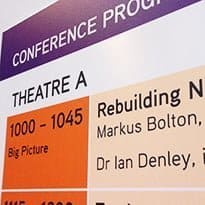The NHS needs to make space for small and medium size IT suppliers – but these same companies need to “up their game” if they are to be taken seriously, EHI Live 2012 has been told.
Markus Bolton, founder of SystemC and now director Shearwater Healthcare Solutions, argued that procurements for NHS IT systems should not exclude SMEs; as this robs the NHS of their agile thinking and innovation.
He said: “I still see procurements saying we only want large suppliers and there is room for both. If you automatically cut out small providers you are cutting out the agile, smart ideas.
“The input to your procurement, even if you do not choose them or choose to include them as partners with a larger company, can be massive.”
Equally, SMEs need to sharpen up their offering, Bolton told one of the opening sessions at the event in Birmingham.
It is no longer enough to be enthusiastic and led by a director with “a 10m mile an hour brain” who cracks problems “using brute force,” he said.
“You have to understand that from now on you will need better implementation methodology, proper testing cycles, proper planning and all the things that take you a step up in terms of delivery.
“You need to compete with large companies at their own game without losing your agility or the values you had as a small enterprise.”
He also argued for NHS trusts to support SMEs better once they have chosen their systems. Shearwater is looking to invest in innovative healthcare IT companies, and offer them expert advice and support.
Bolton said it has already carried out due diligence on a number of SMEs looking for investment and one theme to emerge was that they were not being paid enough for what they were doing.
“We see companies being paid £18,000 a year for maintaining a core, central system in a major hospital. Then we wonder why they do not have the money to invest in developing new products,” he said.
Asked how this could be turned into reality rather than rhetoric, Ian Denley, another director of Shearwater, said: “We have lobbied government to break down large projects into smaller chunks where SMEs can participate. It is a message that this government has picked up on.”
But Jeremy Nettle, chair of Intellect Health and Social Care, which represents more than 300 companies including 230 SMEs, said trusts were still unwilling to engage with SMEs because the risks of working with a company with less than £1m on its books were seen as too great.
Bolton’s session focused on how the NHS could move forward and improve its IT quickly, now that the National Programme for IT in the NHS is winding down.
He called for action in seven areas: improving procurement, focusing on the value rather than the cost of systems, building up SMEs, paying what systems are worth, being transparent about what works and what doesn’t, using consultants wisely, and being prepared to adopt "disruptive" technologies.
But he argued that there is a huge opportunity for NHS IT, because most systems are so old, and there is so much need for IT to support the ‘Nicholson challenge’ for the NHS to generate £20 billion of efficiency savings by 2014-15.
"The people at this meeting and at this conference have the opportunity to make NHS IT work this time around.
"How we use that opportunity will determine whether we are sitting at another conference in ten years’ time talking about another missed opportunity, or about the benefits that using IT have delivered," he said.

